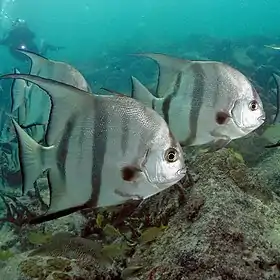Chaetodipterus
Chaetodipterus is a genus of marine ray-finned fishes belonging to the family Ephippidae, the spadefishes. These fishes are found in the Atlantic and eastern Pacific Oceans.
| Chaetodipterus | |
|---|---|
 | |
| Atlantic spadefish | |
| Scientific classification | |
| Domain: | Eukaryota |
| Kingdom: | Animalia |
| Phylum: | Chordata |
| Class: | Actinopterygii |
| Order: | Moroniformes |
| Family: | Ephippidae |
| Genus: | Chaetodipterus Lacépède, 1802 |
| Type species | |
| Chaetodon plumieri Bloch, 1787 | |
| Synonyms[1] | |
| |
Taxonomy
Chaetodipterus was first proposed as a monospecific genus in 1802 by the French naturalist Bernard Germain de Lacépède with Chaetodon plumieri,[1] a species described by Marcus Elieser Bloch on 1787 from Jamaica,[2] as its only species.[1] Chaetodon plumieri is a synonym of Chaetodipterus faber.[2] This genus is classified within the family Ephippidae which is in the order Moroniformes.[3]
Etymology
Chaetodipterus is a combination of di, meaning "two", and pterus, meaning "fin", prefixed with Chaetodon. This is a reference to the original genus the type species was assigned to but with a split dorsal fin.[4]
Species
Chaetodipterus contains three recognized species:[5]
- Chaetodipterus faber (Broussonet, 1782) (Atlantic spadefish)
- Chaetodipterus lippei Steindachner, 1895 (West African spadefish)
- Chaetodipterus zonatus (Girard, 1858) (Pacific spadefish)
Characteristics
Chaetodipterus spadefishes have a highly compressed disc shaped body with a blunt snout and a small terminal mouth which bands of brush like teeth in its jaws. They have a continuous dorsal fin with 9 low, well developed spines and between 18 and 23 soft rays. The spiny part of the dorsal fin is separated from the soft rays part by a deep incision. The anal fin is supported by 3 spines and 16 to 20 soft rays. The front portions of the soft dorsal fin and anal fin are elongated. The pectoral fins are short while the long pelvic fins sit under these. The caudal fin is slightly concave. The head body and most of the fins are covered in scales and the lateral line is complete.[6] The largest species is the Atlantic spadefish, with a maximum published total length of 91 cm (36 in) while the smallest is the West African spadefish, which has a maximum published total length of 31 cm (12 in).[5]
Distribution
Chaetodipterus comprises three allopatric species, the Atlantic spadefish in the western Atlantic, the West African spadefish in the eastern Atlantic and the Pacific spadefish in the eastern Pacific.[5]
References
- Eschmeyer, William N.; Fricke, Ron & van der Laan, Richard (eds.). "Genera in the family Ephippidae". Catalog of Fishes. California Academy of Sciences. Retrieved 2 April 2023.
- Eschmeyer, William N.; Fricke, Ron & van der Laan, Richard (eds.). "Species in the genus Chaetodipterus". Catalog of Fishes. California Academy of Sciences. Retrieved 3 April 2023.
- J. S. Nelson; T. C. Grande; M. V. H. Wilson (2016). Fishes of the World (5th ed.). Wiley. pp. 495–497. ISBN 978-1-118-34233-6.
- Christopher Scharpf & Kenneth J. Lazara, eds. (12 January 2021). "Order ACANTHURIFORMES (part 2): Families EPHIPPIDAE, LEIOGNATHIDAE, SCATOPHAGIDAE, ANTIGONIIDAE, SIGANIDAE, CAPROIDAE, LUVARIDAE, ZANCLIDAE and ACANTHURIDAE". The ETYFish Project Fish Name Etymology Database. Christopher Scharpf and Kenneth J. Lazara. Retrieved 4 April 2023.
- Froese, Rainer and Pauly, Daniel, eds. (2023). Species of Chaetodipterus in FishBase. February 2023 version.
- "Genus: Chaetodipterus, Spadefish, Spadefishes". Shorefishes of the Greater Caribbean online information system. Smithsonian Tropical Research Institute. Retrieved 3 April 2023.